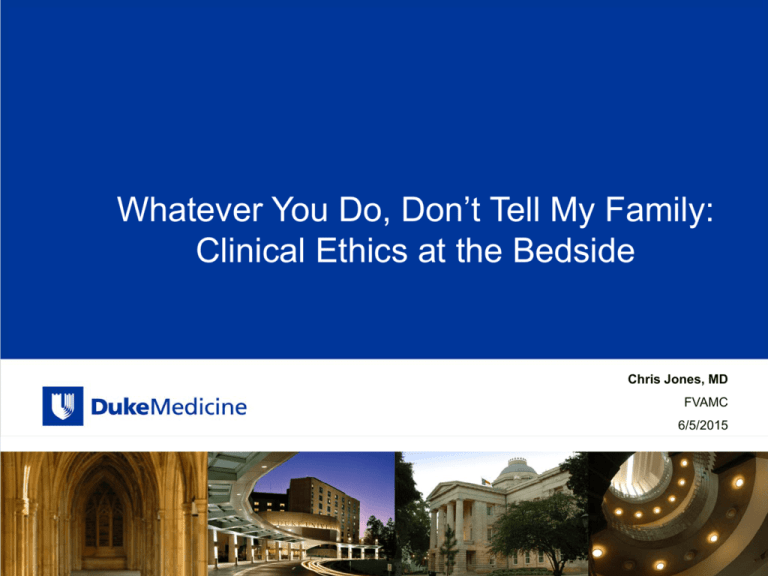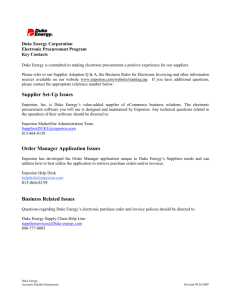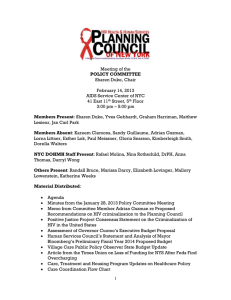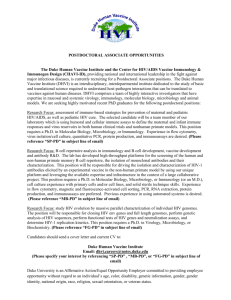
Whatever You Do, Don’t Tell My Family:
Clinical Ethics at the Bedside
Chris Jones, MD
FVAMC
6/5/2015
Disclosures
I do not have any relevant disclosures for this
presentation.
All Rights Reserved, Duke Medicine 2007
Case
Chief Complaint: weakness/diarrhea
35yo female admitted to DUMC in April, 2012 with
recent fungal eye and bacterial dental infection. After
oral surgery, she was placed on Augmentin. She
completed that 3 weeks ago then developed diarrhea
(watery brown 3-4/day – no blood) a week before
presenting. Poor oral intake; eating skittles, gatorade,
and jello.
All Rights Reserved, Duke Medicine 2007
Case (cont’d)
She became unable to walk and developed abdominal
pain. She also developed a new headache (worse with
bright lights) and flat ulcers on her labia.
In the ED, her BP was 70/50 and she got 6L fluid.
Lactate was 14 (12 after 6L fluid). WBC 12. Cr 2.4
(baseline 1.0). AST/ALT 1100/300. INR 5. Abdomen
distended with large liver palpable.
All Rights Reserved, Duke Medicine 2007
Past Medical History
•
•
•
•
Recurrent Thrush
Maxillary abscess s/p oral surgery drainage
R eye fungal infection
Headaches after scooter accident
Social/Family History
• Parents worked for the UN. African by decent. Lived in
US since 2007. Very private person. Lives with a
housemate. Med tech at Assisted Living. Dad died of
DM2. Mom lives in South Africa. Never married and no
children. Christian faith.
All Rights Reserved, Duke Medicine 2007
The Wrinkle
Patient was found to be HIV positive during the hospital
stay for dental abscess. The results came back after
the patient was discharged.
The hospitalist who cared for her spoke by phone and
documented: “I then said that I had some lab test
results to share with her and she abruptly stated that
she was getting ready to go to work and that she
couldn't talk any longer. She stated she would call me
back tomorrow to discuss further.”
All Rights Reserved, Duke Medicine 2007
Telephon-ist
The hospitalist documented a dozen more calls, a full
voicemail, a certified letter (“Please call me to discuss
lab results”), a phone call to her NOK asking for a call
back, a walk to the dental clinic to meet the pt at a
scheduled appointment (pt cancelled), and discussion
with Health Department.
Pt finally answered the phone. “I told her I needed to
discuss test results with her, at which time she said she
needed to go and hung up the phone.”
All Rights Reserved, Duke Medicine 2007
Some HIV Background Information
• 1.1 million Americans are infected with HIV
• 50,000 new infections annually
• As of Dec 31, 2013, over 26,000 HIV+ Veterans
cared for by VA
• Undiagnosed HIV in VHA: 0.1-2.8%
http://www.va.gov/vhapublications/ViewPublication.asp?pub_ID=3104
All Rights Reserved, Duke Medicine 2007
VHA HIV Policy
It is VHA policy that HIV testing be a part of routine
medical care; that providers routinely offer HIV testing
to all Veterans and provide the test to those who give
oral informed consent; and that those Veterans who test
positive for HIV infection are referred fpr start-of-the-art
HIV treatment, prevention of complications, and care of
related conditions, including mental health needs, as
soon as possible after diagnosis.
VHA Directive 1113
All Rights Reserved, Duke Medicine 2007
Question
• What legal issues should we know surrounding HIV
testing and diagnosis?
All Rights Reserved, Duke Medicine 2007
Testing for HIV in VHA Facilities
• VHA Directive 1113 – May 5, 2015
• Lots to do for administrators to become compliant
• HIV testing be part of routine medical care, at least
once for adults over age 18 and annually for HIV
negative adults with ongoing risk factors
All Rights Reserved, Duke Medicine 2007
Health Care Providers should:
• Offer HIV testing to those without a documented test
at first reasonable opportunity
• Document voluntary oral consent in the EMR
• Refer HIV+ patients for ongoing HIV-related care
• Inform HIV+ patients of the following routes of
transmission:
– Parenteral
– Sexual
– Perinatal
• Strongly encourage patients to notify their sexual and
needle-sharing partners about their status
All Rights Reserved, Duke Medicine 2007
North Carolina Specific Laws
All Rights Reserved, Duke Medicine 2007
10A NCAC 41A .0202
CONTROL MEASURES – HIV
The following are the control measures for the Acquired Immune Deficiency Syndrome
(AIDS) and Human Immunodeficiency Virus (HIV) infection:
(1)
Infected persons shall:
(a)
refrain from sexual intercourse unless condoms are used; exercise
caution when using condoms due to possible condom failure;
(b)
not share needles or syringes, or any other drug-related equipment,
paraphernalia, or works that may be contaminated with blood through
previous use;
(c)
not donate or sell blood, plasma, platelets, other blood products,
semen, ova, tissues, organs, or breast milk;
(d)
have a skin test for tuberculosis;
(e)
notify future sexual intercourse partners of the infection;
(f)
if the time of initial infection is known, notify persons who have been
sexual intercourse and needle partners since the date of infection;
(g)
if the date of initial infection is unknown, notify persons who have
been sexual intercourse and needle partners for the previous year.
All Rights Reserved, Duke Medicine 2007
Consequences
• Misdemeanor with up to 2 years in jail (NCGS §
130A-26)
• If intentional infection can be proven:
– Battery
– Assault
– Civil damages
– No NC felony law for murder or manslaughter
All Rights Reserved, Duke Medicine 2007
Back to the Case
• The patient was admitted to MICU. She was found to
have pseudomonas bacteremia, MAC bacteremia,
127,000 copies/mL HIV viral load, and a CD4 count
of <1.
• Team unable to do LP due to coagulopathy from DIC.
• Consults in first 48h included ID, hepatology,
transplant surgery, derm, optho.
• Multiple notes comment that pt unwilling to face
diagnosis of HIV.
All Rights Reserved, Duke Medicine 2007
Case (cont’d)
• By HD#2, notes indicate: “patient is very distraught
about her overall picture and wanted to delay the
conversation of her (HIV) diagnosis for the morn.”
Also: “Family does not know, do not tell them”.
• By HD#3, pt intubated. Prior to controlled intubation
for hypotension/worsening acidosis, she asked that
her family not be told of her HIV diagnosis.
All Rights Reserved, Duke Medicine 2007
• Patient continued to decline and notes included
“prognosis grim”, “withdrawal of care would be very
reasonable”, “unfortunately our team will not be able to
assist you during this episode”.
All Rights Reserved, Duke Medicine 2007
• Daily note progression re: HIV status:
– Family does not know, do not tell them
– Family does not know, do not tell them
– Family does not know, do not tell them as per
patient’s request
– Family does not know, do not tell them HIV
STATUS as per patient’s request
All Rights Reserved, Duke Medicine 2007
Family meetings with ICU team
• Brother/sister made patient “no CPR” prior to Mom’s
arrival stateside.
• “Mom arrived from South Africa had family meeting,
awaiting 72h period off sedation to assess for
neurologic function… were held 4/19 in am”
All Rights Reserved, Duke Medicine 2007
NC Surrogacy Law
•
•
•
•
•
•
•
•
Guardian ad litem
Health Care Power of Attorney
Attorney-in-fact with powers for
Health Care
-----------------------Spouse
Majority of reasonably available
parents and children at least age 18
Majority of reasonably available
siblings at least age 18
An individual who has an established
relationship with the patient, who is
acting in good faith on behalf of the
patient, and who can reliably convey
the patient's wishes.
The patient’s attending physician
VA Surrogacy Hierarchy
•
•
•
•
•
•
•
•
•
NC § 90-322. Procedures for natural death in the absence of a declaration
All Rights Reserved, Duke Medicine 2007
Health Care Agent
Legal guardian or special guardian
-----------------------Spouse
Child age 18 or older
Parent
Sibling age 18 or older
Grandparent
Grandchild age 18 or older
Close friend age 18 or older
VHA Handbook 1004.01
NC Surrogacy Law
•
•
•
•
•
•
•
•
Guardian ad litem
Health Care Power of Attorney
Attorney-in-fact with powers for
Health Care
-----------------------Spouse
Majority of reasonably available
parents and children at least age 18
Majority of reasonably available
siblings at least age 18
An individual who has an established
relationship with the patient, who is
acting in good faith on behalf of the
patient, and who can reliably convey
the patient's wishes.
The patient’s attending physician
VA Surrogacy Hierarchy
•
•
•
•
•
•
•
•
•
NC § 90-322. Procedures for natural death in the absence of a declaration
All Rights Reserved, Duke Medicine 2007
Health Care Agent
Legal guardian or special guardian
-----------------------Spouse
Child age 18 or older
Parent
Sibling age 18 or older
Grandparent
Grandchild age 18 or older
Close friend age 18 or older
VHA Handbook 1004.01
Disagreements on Same Level
Attempt consensus
If consensus cannot be reached, the practitioner must choose the
surrogate who is best able to represent the patient’s values, wishes, and
interests pertaining to the health care decision and document the reasons
for choosing that individual. In cases where the choice is unclear,
controversial, or if a potential surrogate contests the practitioner’s choice of
surrogate, the practitioner must consult with the local Integrated Ethics
program officer or Regional Counsel.
http://www1.va.gov/vhapublications/viewpublication.asp?pub_ID=2055
All Rights Reserved, Duke Medicine 2007
68 hours later
• Patient developed myoclonus vs seizures. Neurology
consulted. Found to have status epilepticus.
• Family distressed by uncontrolled seizures (despite
diligent work by MICU staff and neurology consult
team).
All Rights Reserved, Duke Medicine 2007
Palliative Care Consult
• Ms. J is a 35yoF of African decent who was recently
diagnosed with AIDS with CD4 count of 1. She was
resistant to HAART therapy and was very clear that
nobody in her family should know that she has
HIV/AIDS. She was admitted to the MICU recently
and has developed respiratory, CV, renal, and liver
failure. She has begun having intractable seizures.
Her mother is acting as her surrogate decision-maker
and, per pt's wishes, does not know pt has AIDS. I
was consulted to help with a family meeting regarding
goals of care.
All Rights Reserved, Duke Medicine 2007
Clinical Ethics
The philosophical study
of the potentially
annoying
All Rights Reserved, Duke Medicine 2007
Phone a friend…
What are the major ethical issues in this case?
All Rights Reserved, Duke Medicine 2007
Central Ethical Issues
• Should we disclose the HIV status?
• Autonomy (patient’s or Mom’s)?
• Who decides?
All Rights Reserved, Duke Medicine 2007
Decision With Ethics Input
• In favor of disclosure ONLY if “materially relevant” to
HCPOA’s (mother) decision-making
All Rights Reserved, Duke Medicine 2007
Family Meeting
• Told mother her daughter was beginning to die and
that it was irreversible.
• Offered to focus on comfort and quality of life moving
forward.
• Entire family agreed with that path.
• No disclosure made.
All Rights Reserved, Duke Medicine 2007
IDT Next Day
• I patted myself on the back, happy with the family
meeting’s outcome.
• Very sharp chaplain asked, “What will be on the
death certificate? Won’t the family get a copy to close
her estate and see ‘AIDS’ without anyone there to
support them?”
All Rights Reserved, Duke Medicine 2007
Back to the Drawing Board
• Ethics: “Least worst option” is to disclose and support
the family
• MICU team agreed with disclosure to allow support
• Family unavailable that day for meeting. Disclose
next day.
All Rights Reserved, Duke Medicine 2007
7:05 AM
• Patient died peacefully with family at bedside. Family
leaves shortly thereafter.
• Palliative Med is not here at 7:05 AM.
All Rights Reserved, Duke Medicine 2007
That Morning
•
•
•
•
Arrive at work
Nurse Manager’s morning…
Arrange meeting with family
Return early and unannounced to Decedent Care
All Rights Reserved, Duke Medicine 2007
Federal Confidentiality Rules
Confidential – under normal circumstances, only
healthcare professionals caring for the patient have
access to information in the medical file
HIV/AIDS, substance abuse, and sickle cell anemia are
SPECIAL CLASSES and must have SPECIFIC written
consent to disclose (VA Form 10-5345).
http://www.hiv.va.gov/provider/policy/confidentiality.asp
All Rights Reserved, Duke Medicine 2007
Disclosure Without Consent (VHA)
• To meet a medical emergency
• Research, management audits, program evaluation
• Written request from Public health agency
• Court Order
• To the appropriate component of the Armed Forces
providing health care to the veteran
38 U.S.C. Section 7332 http://www.hiv.va.gov/provider/policy/confidentiality.asp
All Rights Reserved, Duke Medicine 2007
HIV Disclosure Without Consent to
Spouse or Sexual Partner (VHA)
• Physician or counselor has made a reasonable effort to
counsel and encourage the patient to voluntarily provide
this information to spouse or sexual partner (S/SP)
• Physician or counselor reasonably believes the patient
will not provide the information to the S/SP
• Disclosure is necessary to protect the health of the SSP
38 U.S.C. Section 7332 http://www.hiv.va.gov/provider/policy/confidentiality.asp
All Rights Reserved, Duke Medicine 2007
Final Family Meeting
• Mother (as NOK) signs a paper release to allow us to
release patient’s H&P to her (following the letter of
the NC state statute).
• Disclosure was made.
All Rights Reserved, Duke Medicine 2007
Mom’s Reply
“I am so happy it was only HIV. I was worried
she had done something to harm herself. We are
Christian and believe that if you kill yourself, you
may not get into Heaven. I wish I lived closer to
help her to accept her disease and get treatment.
Thank you for caring for my daughter and for
telling us the truth.”
All Rights Reserved, Duke Medicine 2007
Palliative Care, Hospice, and HIV
• Palliative Care is appropriate for patients of any age
with any stage of a serious illness. It can be used
concurrently with disease-directed treatment,
including for patients likely to be cured of their
disease.
• Hospice care is for those in the last 6 months of their
life. It is focused on comfort and quality of life. Most
hospice care is delivered in the patient’s home. 0.2%
of all hospice patients have HIV.
http://www.nhpco.org/sites/default/files/public/Statistics_Research/2014_Facts_Figures.pdf
All Rights Reserved, Duke Medicine 2007
HIV Hospice Criteria
Prognosis 6 months or less. Supporting info:
1. CD4 <25 c/mcL or viral load > 100,000
2. At least one: CNS lymphoma, untreated or refractory
wasting (>33% lean body mass), MAC bateremia,
progressive multifocal leukoencephalopahy,
systemic lymphoma, visceral KS, renal failure not
desiring HD, cryptosporidium infection, refractory
toxoplasmosis
3. Palliative Performance scale <50% (in chair/bed
more than ½ the day)
http://geriatrics.uthscsa.edu/tools/Hospice_elegibility_card__Ross_and_Sanchez_Reilly_2008.pdf
All Rights Reserved, Duke Medicine 2007
Summary
• Ethics is hard
• Per VHA, HIV testing should be offered once to those
age 18 or older and annually to high risk patients
• VHA requires specific written consent to disclose HIV
status in most cases (exceptions apply)
• Federal law offers clear surrogacy rules – know them!
• Hospice care is appropriate for HIV patients with 6
months or less to live
• Even for adults, sometimes the imagined is worse
than the real.
All Rights Reserved, Duke Medicine 2007
Thank you!
Christopher.A.Jones@duke.edu





